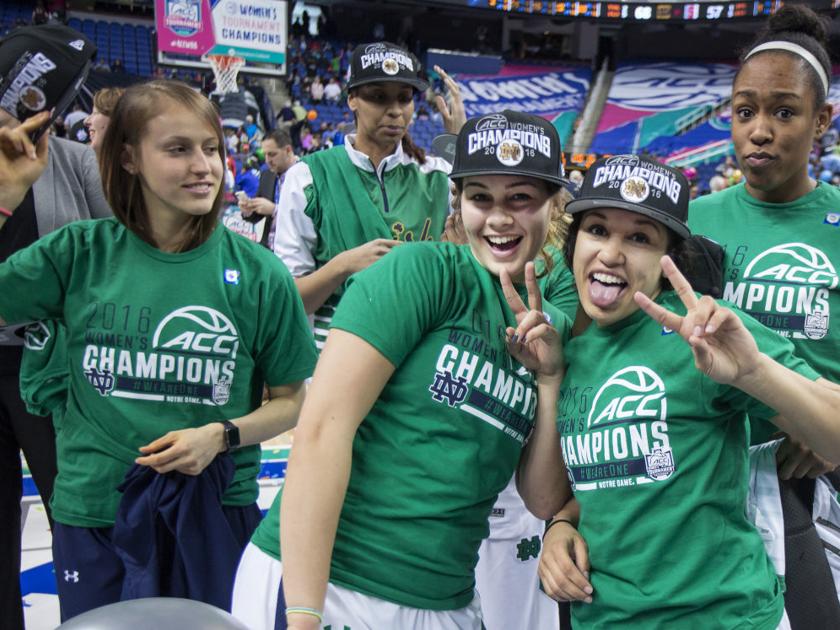GREENSBORO — The trip to the beach is over. There was no ocean view, and the place was a little cramped.
Now it’s back home and back to business as usual.
After a one-year hiatus, the ACC women’s basketball tournament tipped off this afternoon at the Greensboro Coliseum as 12th-seeded North Carolina defeated 13th seed Boston College 69-64 in the opener.
“When you leave home for a trip, isn’t it nice to come home?” said Nora Lynn Finch, the ACC’s associate commissioner for women’s basketball. “You get all gussied up to go someplace new, and then you can’t wait to get home. It feels a little like that.”
The tournament, which features five teams ranked in the AP top 25, runs through Sunday, 14 games played over five days.
“It is good to be back. It really is,” ACC commissioner John Swofford said. “This has become the home for the ACC women’s basketball tournament. The Coliseum’s people do such a great job. The city itself and the surrounding area have embraced it. Our teams really enjoy coming here. So we’re really looking forward to being back in the Coliseum.”
It’s the 18th time in 19 years that the Coliseum has hosted the event.
The hiccup in that timeline came last year, when the league made a hasty trip to Conway, S.C., to play the tournament a little more than 15 miles inland from Myrtle Beach. It was a forced vacation, part of the ACC’s championship boycott of North Carolina while House Bill 2 remained a state law.
The so-called “bathroom bill” required transgender people to use public restrooms and locker rooms that correspond to the gender on their birth certificates. It also prevented local governments from enacting their own anti-discrimination rules that include lesbian, gay, bisexual and transgender people, as well as raising the minimum wage in their communities.
The NCAA and ACC viewed HB 2 as discriminatory against LGBT people. And both sports organizations moved all neutral-site championship events — 17 in all, including the ACC women’s tourney — out of North Carolina for the year the law was on the books before it was repealed last March.
“I really believe it affected our community spirit a little bit,” said Kim Strable, president of the Greensboro Sports Commission. “We were so accustomed to doing what we do so well, and the ACC is a special partner to Greensboro. So to lose their championships, as well as the NCAA stuff … when it’s absent it hurts. And there was no guarantee it was going to change. It’s pretty special to get it back.”
The beach
The women’s tournament has flourished since it moved from Charlotte to Greensboro in 2000.
Attendance grew steadily, peaking at an ACC-record 73,187 in 2009. It averaged 58,989 over the next seven years.
But last year, playing in Coastal Carolina’s 3,370-seat HTC Center, five-day attendance fell to 30,387, despite standing-room-only sellouts of 3,600 for the semifinals and finals.
“Certainly from our perspective,” Greensboro Coliseum managing director Matt Brown said, “we think they’ve found a home here and they shouldn’t need to look elsewhere. I think that was proven last year. I felt bad for them, playing at another conference’s school with VIP (hospitality) out in the hall. It wasn’t what the women had always looked forward to or the treatment they get in Greensboro. There’s a history here, and we’ve nurtured it.”
It’s a history built on hospitality. The Greensboro Sports Foundation, the newly rebranded tournament host committee, provides a small army of volunteers to help the teams and their fans visiting Greensboro.
“We didn’t want to leave. It was not our choice,” Finch said. “I mean, why would you leave here for any place else? Because nobody does it better. We went, and we were taken care of. Myrtle Beach did as well as anyone could under short notice. But, golly, coming home is nice. There are so many familiarities, so much enthusiasm, so much this building can offer that very few other places can afford us. It just doesn’t get better.”
The bottom line
The loss of the NCAA and ACC events last year hit where it hurt.
One of the sponsors of this year’s tournament is the Guilford Merchants Association. Close to 1,000 companies and all their employees are GMA members, and Mark Prince is the group’s president and CEO.
“Not as many people as I’d like understand how important (sports tourism) is,” Prince said. “One of our efforts, one of our strategic initiatives, is to try to get businesses to understand that it may not be a direct impact for them, but the indirect impact from an economic development standpoint and quality of life affects all of us.”
The Greensboro Convention & Visitors Bureau estimates the economic impact of the ACC men’s and women’s swimming championships at the Greensboro Aquatics Center followed by the women’s tournament will generate $6.5 million over the course of three weeks.
About $4 million of that comes from the basketball alone.
“Last year was not good. Not good at all,” Prince said. “Not good for the area and the reputation we try to maintain of being the best, of being Tournament Town. It was difficult for a lot of businesses that suffered without it. We’re glad to have it back.”
And the ACC is glad to be back, Swofford said. Glad the law is off the books and the boycott is over.
“It was a hard decision for our league to make, and the transitions that were made were challenging,” Swofford said. “… Fortunately, it was just a one-year hiatus, and we’ve added a year to our agreements to make up for missing last year.
“Everybody’s always appreciated what we’ve got here in this particular tournament. The people in Myrtle Beach and at Coastal Carolina, although it’s a much smaller arena, they were fantastic to us. The experience was good. But this tournament belongs here. It’s home.”

